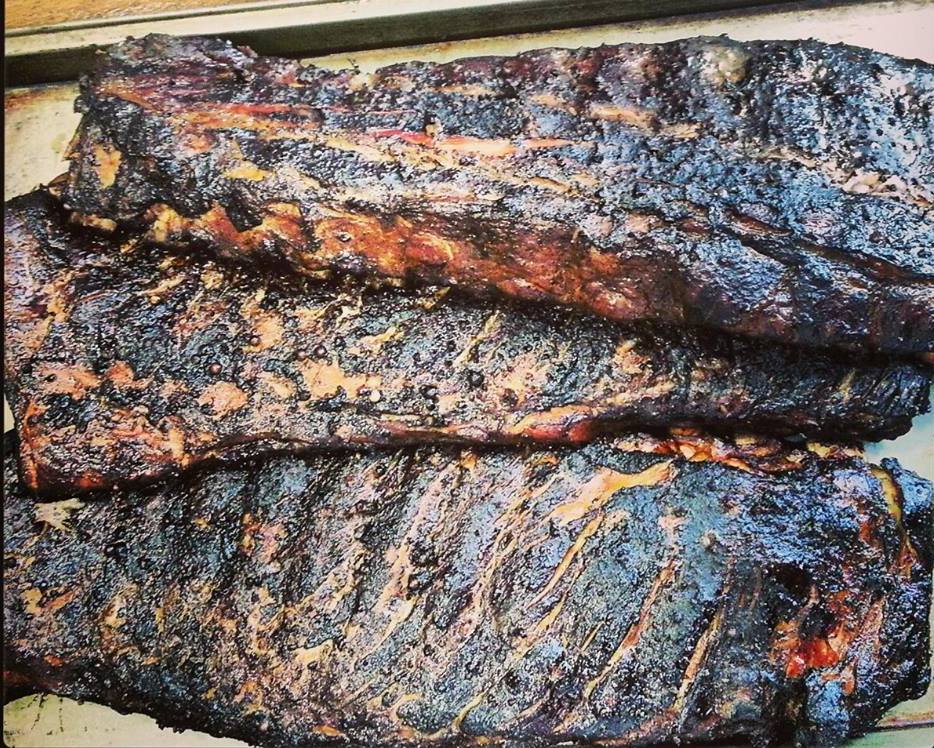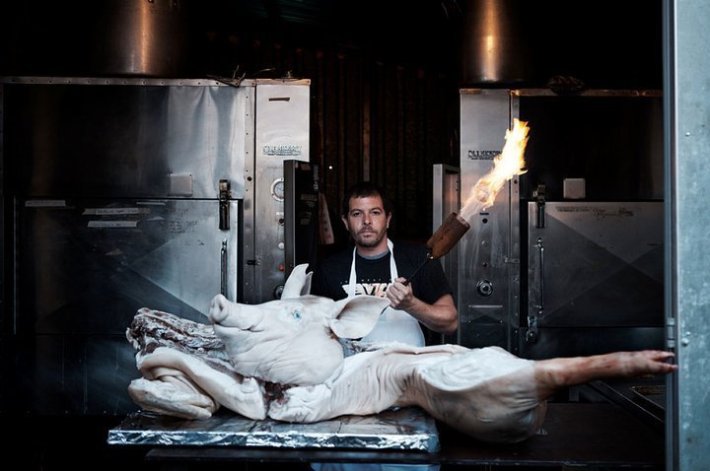
Barbecue stands strong as the enduring, finger-lickin' legacy of American roots cooking. Long before Memphis ever pulled its pork, the Arawak were pit-smoking meats in the West Indian islands. Generations before Texans teamed mesquite-smoked brisket with tequila cocktails and white bread, privileged MesoAmericans were pounding pulque and sotol, smoking chilies, and slow-cooking a menagerie of animals that may have included iguana, turkey, and tapir in their subterranean earth ovens. When it comes to our own great city, the great migration of Southern-born African Americans to Los Angeles over the turn of the 20th century leaves our landscape still dotted with sturdy barbecue spots mostly in the Texan tradition, represented today by dedicated, smoker-strapped pitmasters like Neal Strawder of Bigmista's Barbecue, Kevin Bludso of Bludso's BBQ in Compton, and The Spot, which until recently showed up with killer smoked turkey necks and slabs of pork ribs at West Compton's Prayer Assembly Church every other weekend.
This summer, prominent pitmaster Robbie Richter will open Roadhouse L.A. at The Hollywood Improv with backing from Umami Burger entrepreneur, Adam Fleischman. Richter is a Queens native making the move to Los Angeles for his first solo venture. But before a rousing course of California cue-junkies can start crying, "This stuff's made in New York City!" keep in mind that Richter made his bones on the intensely cutthroat competitive barbecue circuit, contests judged in the strictest seriousness by the Kansas City Barbecue Society that offer champions five-figure purses. Through his work at Manhattan's Hill Country and Brooklyn's Fatty Cue, this East Coast pitmaster is among a tiny handful of names responsible for making "New York Barbecue" a term we now think twice about snickering at. Of course, pit-cooking is believed by some scholars to have originally spread to the South from the East Coast (think underground clam bakes in New England), no matter that native Americans had their own form of pit-cooking in the American South West.
At Roadhouse L.A., Richter plans to smoke meats in a more global approach to barbecue, taking the meat-steaming, roasting, and smoking traditions of the entire world into consideration for a fresh take on the genre. Richter debuted a few of the items he's been working on this past week at This Is Not a Pop-Up, the culinary incubator that allows chefs to test restaurant concepts during evenings at Hollywood's Tiago Cafe. Celebrating Memorial Day with an appropriate feast of smoked meats and hoppy beer, we nuzzled up to the bar here on Saturday night to indulge in the imported pit-master's menu.
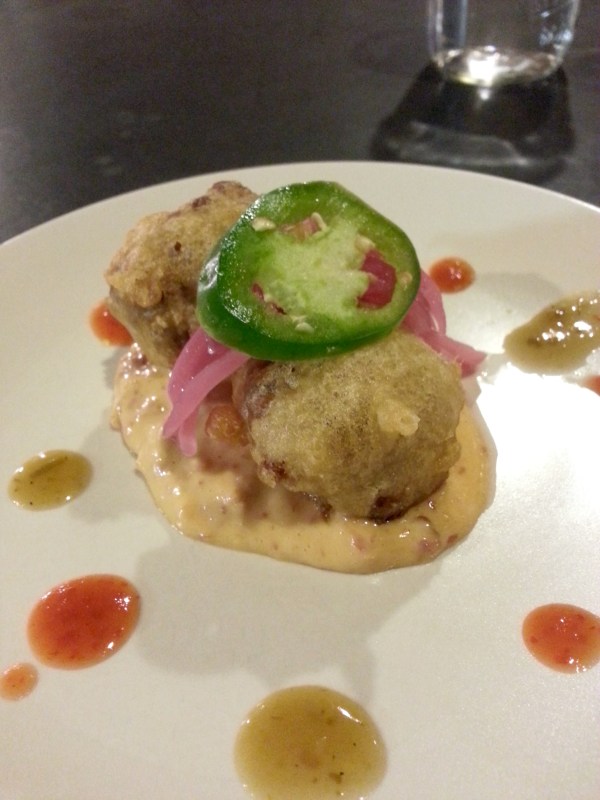
The Southwest meets Southeast Asia in this small serving of house-smoked Tejas sausage battered with Bock beer, lightly fried to a tempura-shell, and topped with pickled onions and a wheel of fresh jalapeno. Meant to be eaten in one single bite, the fritter shatters with natural pork juice and an oozing cream of molten-hot queso, the thick cheese dip popular in San Antonio and its surroundings, placed on a bed of marrow mustard and a stunnning aioli infused with bits of lap cheong Chinese sausage, and circled by dollops of Gindo's Spice of Life.
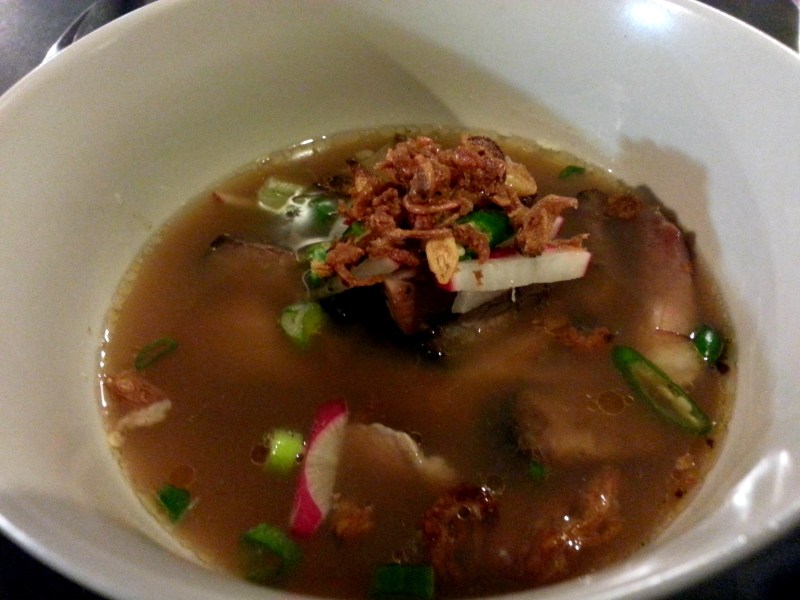
Next Richter served a bowl of "brisket shabu shabu," though its influences felt more far-reaching. The beefy bone broth reminded us more of Vietnamese pho, the bits of radish and jalapeno gave us flashbacks of pozole, slick and soft pieces of cured fat had us recalling tonkotsu ramen, and the crispy onions and brown veneer suggested a slip of French onion soup, with searing heat coming from a scattering of Thai chilies. Brisket typically marks the most challenging cut for barbecue chefs to tackle, as it's a large piece of meat with two distinct sides: the leaner top section, called "the flat," and a fattier section on the bottom known as "the deckle." Richter prepared both cuts in different ways in his shabu shabu, the fattier, softer slices beautifully contrasted by the crunch of the radish and crispiness of the fried onions and the sturdier flat pieces soaking in the meaty stock.
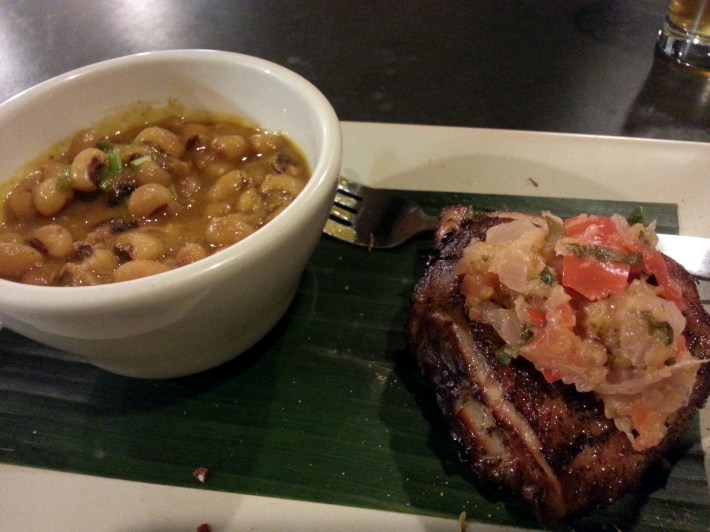
For his Jamaican jerk Frenched cupcake chicken, Richter employed the cupcake tins that competitive pit-masters use to give their poultry a uniform shape, as first innovated by three-time barbecue world champion Myron Mixon of Jack's Old South BBQ in Georgia. "Frenched" refers to the preparation whereby the skin remains on the breast, while its breastbone and first two wing joints are removed. Using milder, sweeter cherry wood to smoke his bird, as opposed to the faster-burning, intensely-flavored mesquite chips he used on his other meats (Richter had to improvise a smoker of sorts rather than bring his own from New York), the pitmaster topped his chicken with a drunken pineapple salsa and served it alongside a bowl of curried black eyed peas bearing the distinct tropical sweetness of coconut milk. Jerk chicken, which is almost always smoked with all-spice wood (called "pimento" in Jamaica), is directly descended from the original barbecue (or "barbacoa") made by the Arawak people indigenous to today's West Indian islands.
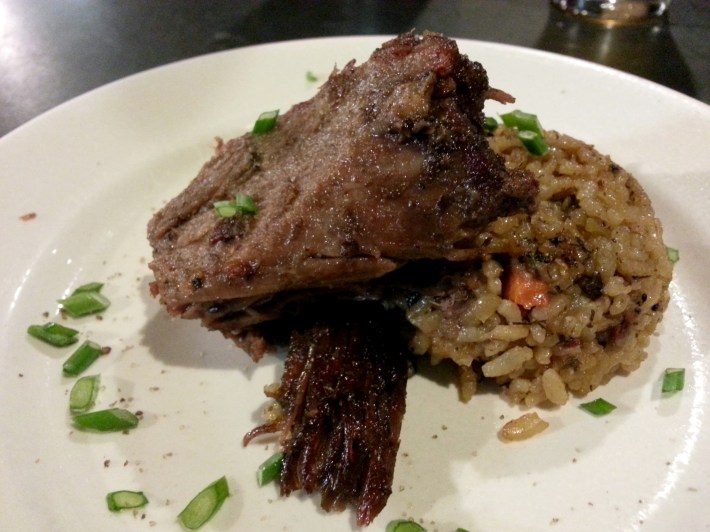
Richter paid homage to North Africa and Central Asia in this dish of Moroccan-spiced, hand-pulled lamb shoulder served aside plov, the Uzbek-influenced style of pilaf. The shoulder was saturated with flavor, splitting the difference between tender and toothsome with the game meat coming apart in tender rags. The plov was a standout, packed with the aromas and tastes one gets hit with when entering a spice bazaar. Richter gets his spice blend from an Uzbek store in Queens, but is still trying to figure out which spices it contains given that the package is written in Cyrillic.
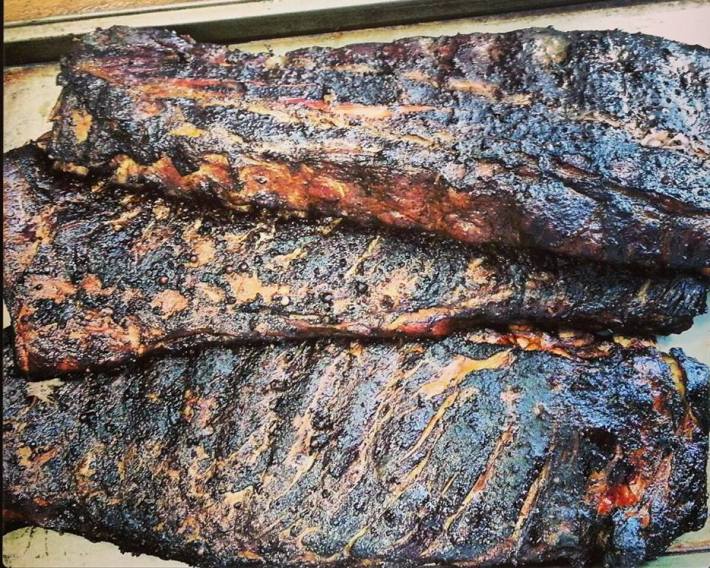
Finally came the star of the show, Richter's spare ribs, sold for $27 for a whole rack, $17 for a half rack. The ribs, which we neglected to take our own photos of (blame the excessive consumption of meat*), were glazed with palm sugar, beautifully trimmed and cut, and aggressively spiked with salt and pepper, which left a calm fire spreading through the mouth in an eternal finish. The ribs', and indeed the entire dinner's, only misstep revealed itself in a pool of Vietnamese fish sauce puddled under the ribs like a spilled splash of soy sauce in a take-out bag of Chinese food, unnecessarily upping the umami factor of the smoked pork way past eleven and giving them the strange and funky flavor of parmesan.
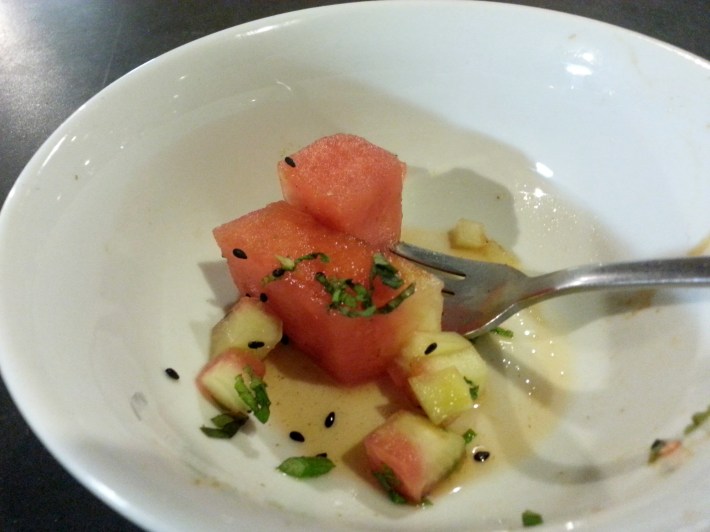
The chef helped temper the heat of his spare ribs with a fantastic watermelon salad speckled with black sesame seeds and torn basil. Richter gave the watermelon flesh a sweet cure, saving tiny cubes from the harder rind for a sour cure. As This Is Not a Pop-Up serves its $50 menus with a BYOB option, we paired our dinner to El Segundo Brewing's Citra Pale Ale, its hop-forward flavor standing up to Richter's bold flavors, but subdued enough not to interfere with its nuances, pairing particularly well to his shabu shabu and Tejas tempura sausage.
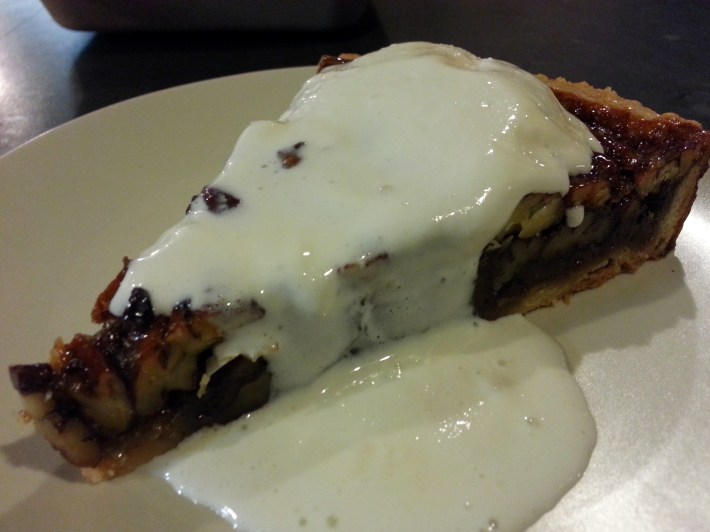
Roadhouse L.A. offered pecan pie from North Hollywood's Cake Monkey for dessert, served a la mode with a scoop of Moonshine ice cream from L.A. Creamery, which Fleischman acquired an ownership stake in last year.
So what does a Southwestern city with extensive Southern heritage have to learn about barbecue from a New Yorker? Richter's extensive history in the world of competitive barbecue and stereotype-defying restaurants means that L.A. will soon be getting another genuine pitmaster who knows how to cook low and slow with authentic results. Richter's clever weaving of Southeastern and Central Asian, Mexican, Japanese, North African, Slavic, and Caribbean flavors and influences into his traditional techniques should ultimately appeal to L.A.'s varied and all-embracing palate, connecting the global panoply of meat appreciation into one solid shape. Impressed by his initial test run, we look forward to seeing what else he has in store as Roadhouse L.A. gets ready for its debut in West Hollywood this summer at The Hollywood Improv.
*Ribs photo via This Is Not a Pop-Up.
